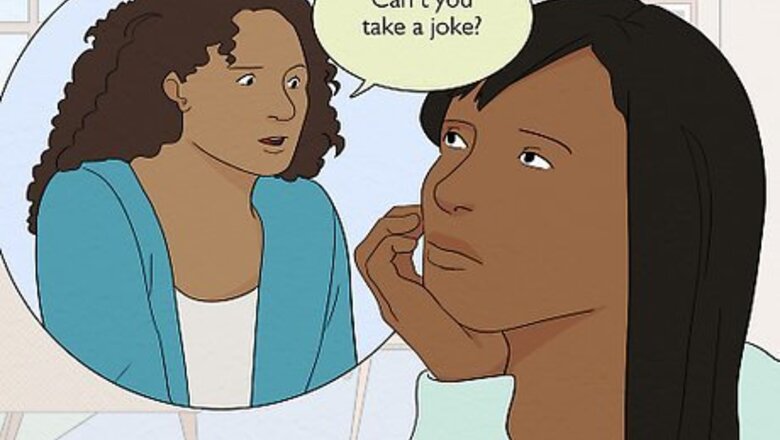
views
Recognizing Signs of Emotional Abuse

Notice attempts to humiliate, invalidate, and criticize. You might feel like you're constantly being judged, degraded, or dismissed, especially in front of other people. An abuser might not give you credit for your accomplishments, or say that your achievements are insignificant. When you bring up your concerns, an emotional abuser might tell you that you're being too sensitive or say you can’t take a joke. Note that emotional abuse doesn’t just occur in romantic relationships. A friend, relative, peer, teacher, or someone else in your life could try to embarrass you or constantly dismiss your opinions.
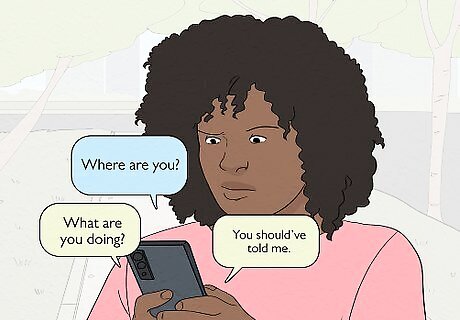
Look for behaviors related to domination and control. Your romantic partner or friend might make you feel like you need permission to hang out with other people. They might try to isolate you by preventing you from seeing your loved ones. You might feel like you can’t even make the smallest decisions. In a romantic relationship, an abusive partner might try to control your finances and make you ask permission before spending any money. They might also want to know what you’re doing at all times, and demand the password to your phone, email, and social media accounts.

Note signs of emotional distance and manipulation. An emotional abuser might deny affection or attention as punishment. If you have a disagreement, they might give you the silent treatment instead of resolving your differences. Emotional distance is meant to make you feel like you’re always at fault, even if you did nothing wrong. An abuser might also attempt to manipulate your emotions by threatening to harm themselves if you do something they don’t want you to do.
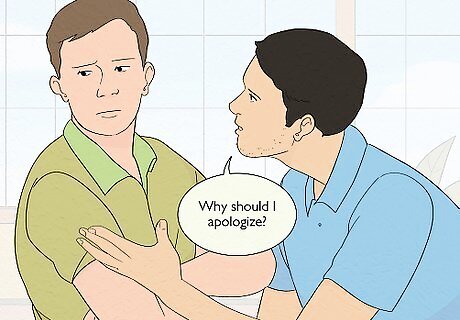
Think of occasions when your partner has accepted blame. An emotionally abusive person doesn’t accept blame or apologize. They might constantly deny or embellish facts to make themselves look like the victim. In addition to never admitting to a fault, emotional abusers often can’t laugh at themselves and don’t tolerate being teased by others.

Ask yourself if your partner disrespects your personal boundaries. Someone who’s emotionally abusive might share your personal information without your permission. Instead of treating you like an individual with your own will, they expect you to do what they think is best for you at all times. Additionally, they might not have many other connections with other people. They might demand your constant attention and discourage you from forming personal relationships with other people.
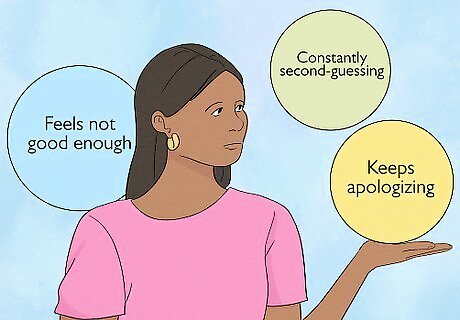
Learn to recognize signs of gaslighting. Gaslighting is when an emotionally abusive person leads you to question your own sanity or reality. It's subtle and develops in stages, and it can lead you to believe an emotionally abusive person isn’t doing anything wrong. Signs of gaslighting include: Constantly second-guessing yourself. The need to apologizing for everything, even for insignificant or non-existent errors. Constantly finding excuses for the abusive person’s behavior. Difficulty making simple choices. Feeling that you're not good enough for the emotionally abusive person.
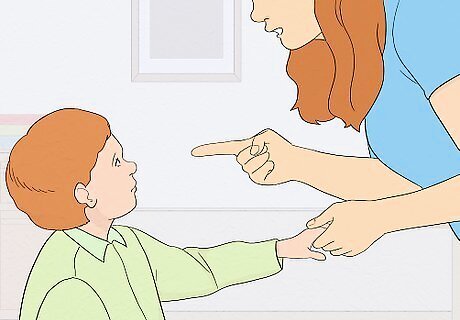
Spot signs of child abuse and neglect. Signs of emotional abuse in children are different than in romantic relationships and can be difficult to recognize. You might notice sudden changes in behavior, withdrawal, increased aggression, frequent absences from school, weight changes, or soiled clothes. Forms of emotional abuse might include belittling or degrading a child (especially in public), name-calling, constantly ignoring a child, not allowing them to make friends, withholding positive emotions or encouragement, and failing to meet their dietary, hygienic, and other basic needs.

Trust your instincts if you’re not sure whether a situation is abusive. Even if you're concerned about a friend, relative, or child, you might not be sure if you should intervene. Alternatively, you might suspect that something is wrong with your relationship, but aren’t sure if it’s abusive. When in doubt, reach out to a trusted loved one, or get advice from a mental health professional or licensed social worker. On its own, emotional abuse is a serious matter. It could also be sign of present physical abuse or escalate to physical violence in the future. If you think something’s wrong, don’t hesitate to act on your concerns.
Getting Out of an Abusive Relationship

Acknowledge that your relationship is unhealthy. It might be hard to admit or recognize, but the first step is to acknowledge that you’re the target of emotionally abusive behavior. If a friend or relative has brought their concerns to you, listen to them. If you think that a romantic partner or friend might be mistreating you but are unsure, discuss your feelings with a trusted loved one or mental health professional. Keep in mind an emotionally abusive person will try to excuse their behavior, make you think their actions are normal, or blame you.
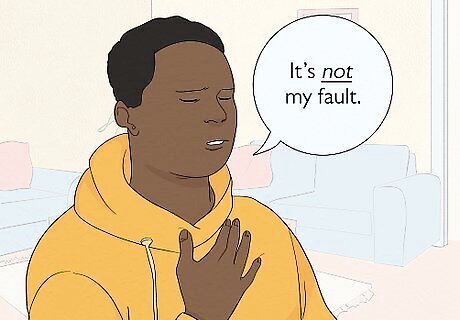
Remind yourself that you are not to blame. You’re not responsible for someone else’s abusive behavior. You might ask yourself how you could have prevented the situation or scold yourself for letting it happen. While these are valid responses to abuse, an abuser chose to be abusive, and you are not responsible for those choices. Don’t dwell on prior signs you think you should have recognized or decisions you could have made in the past. Remember that emotional abuse can be subtle and barely noticeable at first, or it can occur suddenly with no warning signs.
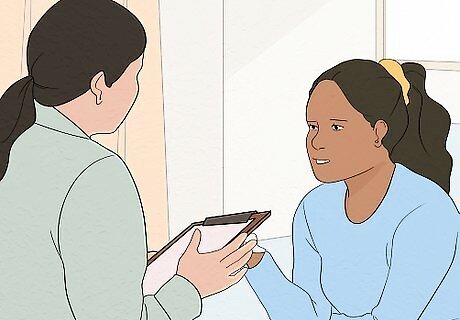
Talk to a mental health professional. Look online or ask your primary doctor for a referral to a therapist or counselor that specializes in emotional abuse. If money is a concern, look up state-administered mental health services available in your county. If you're a student, contact your school’s health center or counselor. If you find that you are in a codependent relationship with your abuser, a counselor can help you refocus. Some signs of codependency include difficulty making decisions, difficulty communicating, valuing your partner's approval above your own, poor self-esteem, and making excuses for your partner's behavior. If you're in a romantic relationship with the abuser, seeking couples counseling to save the relationship is a difficult, personal decision. For instance, it's normal to feel like you should try to save your relationship if you've spent 10 happy years with someone whose behavior has changed only recently. A counselor can help you understand how serious the situation is, affirm that the abusive behavior is unacceptable, and help you both develop skills to improve your relationship. Involving a mental health professional might help your partner understand that they need to change their behavior or the relationship must end. Couples counseling is unlikely to remedy cases of long-term emotional abuse. If your situation is long-term, has escalated, or you've been threatened with physical violence, focus on empowering yourself to end the relationship and move forward.

End the relationship in the safest way possible. Don’t make excuses for abusive actions or try to change the abuser’s behavior. Whether it’s a friendship or romantic relationship, cut ties with the person who’s mistreating you. Accentuate the positive, and remind yourself that you deserve to be treated better. End the relationship as long as it’s safe to do so. If you live with an emotionally abusive partner and are concerned they might become violent, you might not be able to safely leave right away. If necessary, develop a safety plan and get help from your loved ones and legal authorities. If you feel afraid or alone, you can always reach out to support organizations for help and guidance. In the U.S., for example, you could call the National Domestic Violence Hotline.

Disengage from abusive interactions if leaving isn’t possible. You might be able to leave an abusive situation immediately, especially if you live with the abuser. Do your best to ignore their behavior, as long as it’s safe to do so. If they become physically violent, call emergency services and put your safety plan into action. For example, if they insult you or dismiss your opinions, try to stay calm and ignore them. Instead of engaging them by showing them you’re upset or explaining your opinion, try visualizing calm surroundings or singing a happy song to yourself. Do what they say if you think you need to comply in order to prevent physical violence. For instance, you might need to let them look through your phone if they threaten violence. Remember to get help and leave a physically abusive situation as soon as you can safely do so.

Lean on your support system. If you’re upset about ending a relationship, lean on your trusted loved ones for emotional support. If you’re leaving an unsafe situation, ask your loved ones if they can offer a place to live, accompany you to court appointments, provide childcare, and help you get back on your feet. In addition to reaching out to friends and relatives, you can also get help from a local domestic abuse shelter or community organization, talk to a counselor, and look for legal resources from local criminal justice organizations.
Preventing Physical Violence
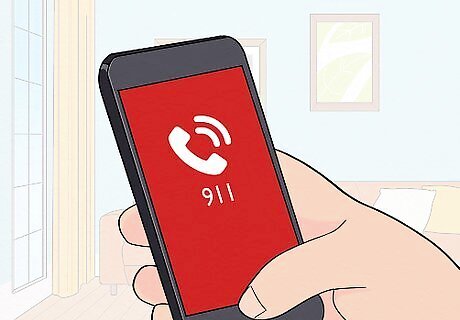
Get help immediately if you’re in danger. Call emergency services if an emotionally abusive person is physically violent or threatens to hurt you or your loved ones. Take their threats seriously, even if an emotionally abusive partner or friend hasn’t been violent in the past. Describe the person's abusive behavior and threatening language to the emergency services operator. When authorities arrive, they'll question the person and, depending on your local laws and the nature of your complaint, take them into custody. Ask officers for a copy of the police report. After the crisis, file a restraining order against the abusive person if you're concerned about your safety.
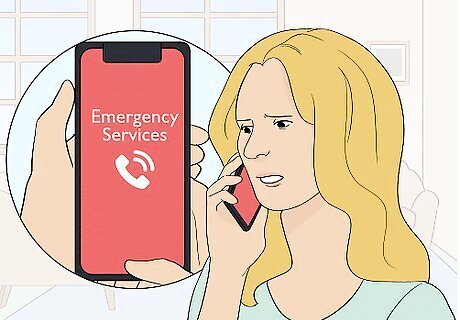
Call emergency services if they threaten to harm themselves. An emotionally abusive person might threaten to hurt themselves or commit suicide in order to control you. Get emergency help if you believe they will truly attempt to harm themselves, have a plan of doing so, or have immediate access to a weapon or other means of committing suicide. Tell the emergency services operator if the abusive person has a history of mental illness, and ask for responders trained in diffusing emergencies related to mental illness. If they regularly threaten suicide to control you, don't give in to their threats. Tell them that you are not responsible for their choices and that you will not give in to their demands. Maintaining your boundaries and leaving someone who repeatedly threatens suicide aren't easy. Remind yourself that these patterns are unhealthy, that your partner's intention is to control and intimidate you, and that they are responsible for their own actions.
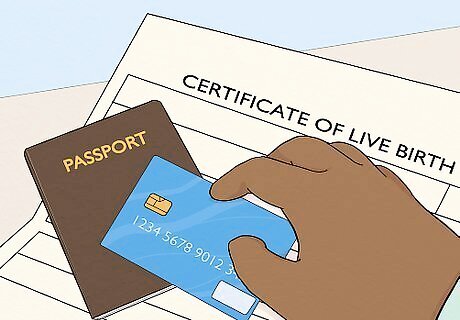
Develop a safety plan if you’re concerned about physical violence. Make sure it’s physically and financially safe to leave an abusive situation before you act. Make arrangements with a friend or relative so you (and your children, if you have any) will have somewhere safe to go. If you live an emotional abusive romantic partner, try to pack essential documents, such your driver's license, passport, social security card, and birth certificate. Try to pack medications, valuables, and any other essential valuables. If possible, open a new bank account that your abusive partner can’t access. Make a copy of your car keys and hide them in case your partner takes away your keys. Memorize the phone numbers of trusted loved ones in case your partner takes away your phone. You could also get an emergency cell phone just in case. Many shelters offer free emergency prepaid phones.
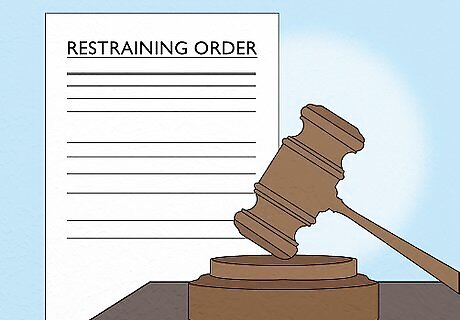
Get a restraining order if you’re concerned about your safety. Head to your local courthouse to get a protective order. Call ahead to see if you need an appointment. Ask the court clerk for the required forms and ask for instructions about filing them. It’s helpful to bring a picture of the abuser, their home and work addresses, a written description of their abusive actions, and any photographs, medical records, or police reports related to the abuse. Ask a trusted friend or relative to go to the courthouse with you to provide moral support. There are no fees for requesting a domestic violence protective order, and you do not need a lawyer to file one.
Helping Someone Who’s Being Abused

Share your concerns in a private, distraction-free place. Call emergency services if you’ve witnessed physical abuse, threats of violence, or if you believe your loved one is in immediate danger. If you don’t believe the situation is an emergency but are still concerned, choose a comfortable setting where you can speak privately with your loved one, such as your home or a quiet park. Ask them to set aside some time to chat without any distractions. Clear your schedule, and choose a time when you won’t receive work calls or get called away by any other duties. If you or your loved one have children, ask someone to look after the kids during your conversation.
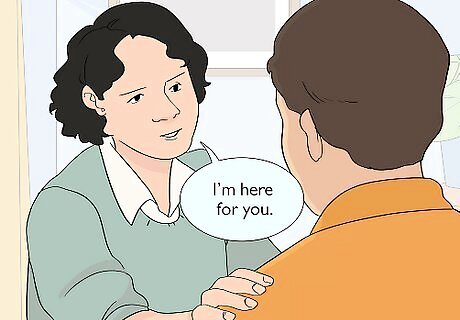
Listen to them and validate their emotions. Start the conversation by saying, “I care about you, and I want to make sure you’re okay.” Mention the observations that concern you, provide information on what an abusive relationship looks like, and let them open up about them at their own pace. For example, you could refer them to websites for domestic abuse support organizations to read up on the issue on their own terms. If they resist or make excuses, let them know that you understand the situation is complicated. Tell them, “I understand this is difficult. I don’t want to pressure you or make you uncomfortable. I’ve just been worried about you and want you to know I’m here to help in any way I can.” They might not want to leave the situation, or they may leave and go back several times. Continue to be supportive, and encourage them to talk to a counselor or social worker. Say, “If you’re not ready to leave, I’m still here for you, no matter what you decide to do.”
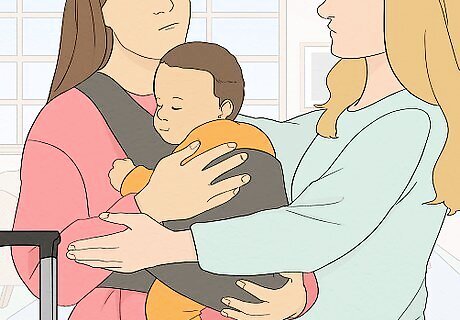
Offer to help in specific ways. Let them know that you’re available to help in any way you can. Give them specific examples, such as letting them stay with you, providing transportation, watching their kids, or taking them to the courthouse.

Ask a professional if you’re unsure about your suspicions. It can be difficult to know for sure if someone is in an abusive situation and requires your intervention. Instead of keeping your suspicions to yourself, seek advice from a mental health professional, social worker, or community organization. You might be suspect that a loved one is the target of abuse, witness or hear troubling behavior next door, or see concerning signs in a child and not know what to do. Look online for a local community organization dedicated to preventing domestic violence or child abuse. Tell them what you’ve observed and ask what actions they recommend. You could ask a trusted loved one for advice.

Report emotional abuse anonymously, if desired. If you think a situation might be abusive but don’t want to be directly involved, there are several ways to report it anonymously. You could call emergency services or your local police department and ask that they perform a welfare check. You could also contact a local community organization focused on domestic or child abuse. Provide details about your observations, and ask that you remain anonymous. They can then get in touch with the appropriate authorities.



















Comments
0 comment